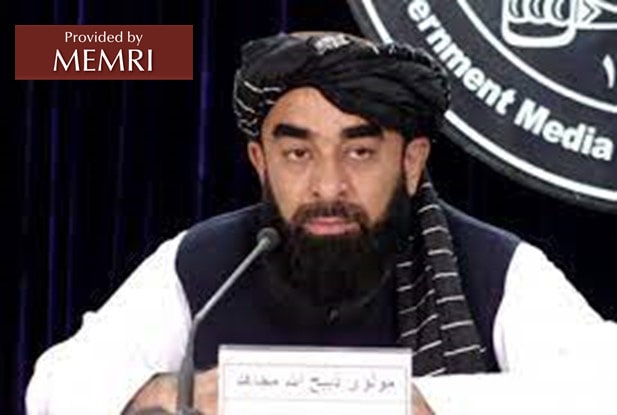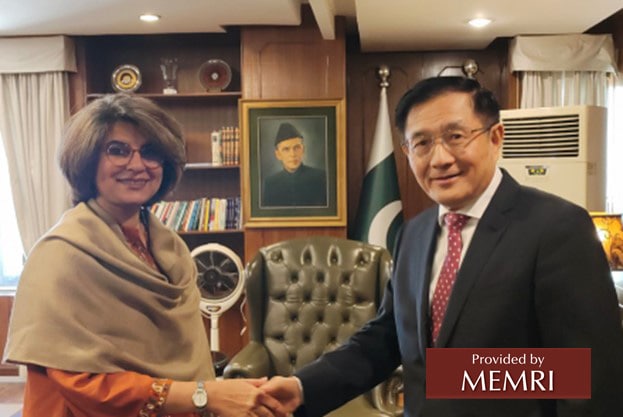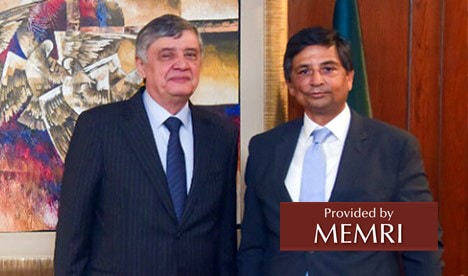In a Dari-language interview broadcast by Tolo News, Afghan Taliban spokesman Zabihullah Mujahid discussed China's and Russia's diplomatic engagements with Pakistan recently and their impact on Afghanistan, and also stressed that Afghanistan's economic interests and Islamic values will prevail over the Taliban-ruled country's foreign relations.
Mujahid also stated: "The stability and security established in Afghanistan are not only vital for Afghanistan and its geography but also for the region as a whole – so that distant countries [such as the U.S.] and some countries [e.g., Russia] that previously engaged in aggression toward Afghanistan and destabilized the region from here do not get the opportunity to do so again."
His interview followed two important visits to Islamabad – one by Russia's Special Envoy for Afghanistan Zamir Kabulov and the other by China's Special Envoy for Afghanistan Yue Xiaoyong – amid Pakistan's accusations that Afghanistan harbors the anti-Pakistan jihadi fighters of Tehreek-e-Taliban Pakistan (TTP).
Zabihullah Mujahid also spoke about U.S. President-elect Donald Trump, indicating that the Taliban rulers view Trump as a businessman who should focus on economic ties with Afghanistan. "If you observe his policies and his requests, he is an economic person, and he will focus on economic matters and American interests," Mujahid said.

Afghan Taliban spokesman Zabihullah Mujahid (source: Tolonews)
Following is a translation of the interview:
"Some Of The Complaints That Pakistan Has Always Had About Afghanistan May Have Been Raised, But They Are Not The Totality Of The Issues; China And Russia Understand That Afghanistan Is Secure And Stable, And The Islamic Emirate Is Committed To Ensuring That Afghan Soil Will Not Be Used Against Any Country"
Question: "Regional efforts regarding Afghanistan have intensified these days. Are you aware of what they are about?"
Zabihullah Mujahid: "Without a doubt, the Islamic Emirate of Afghanistan is striving to maintain constant contact with all countries, especially those in the region, and to make progress in various areas, including economic relations, diplomatic relations, and other fields where Afghanistan and the region share common interests. Due to the positive policies of the Islamic Emirate of Afghanistan, particularly its impact in the diplomatic sector, countries are holding discussions and consultations regarding Afghanistan to improve their relations with the country and to establish regional coordination."
Question: "But Mr. Mujahid, why do regional countries seemingly view Afghanistan as an issue?"
Zabihullah Mujahid: "The only understanding we can derive is that regional countries do not view Afghanistan as an issue but rather as a country and an economic and security partner. This is because, in their meetings with us, in their communications, or in the high-level interactions between Afghanistan and these countries, Afghanistan has maintained its position in the region. That is, Afghanistan's significance is well-recognized by them – its economic importance, regional importance, and political importance – all of which are impactful. These factors almost align shared matters among the countries. This is why countries discuss Afghanistan among themselves and, from time to time, hold effective meetings with Afghanistan. Afghanistan, as an independent country, retains its own significance."
Question: "Does the Islamic Emirate welcome the efforts that have intensified in recent days by regional countries, especially China and Iran, Mr. Mujahid?"
Zabihullah Mujahid: "What is important is what benefits Afghanistan. We have two very significant, or even three, dimensions where Afghanistan needs relationships with all countries, particularly Russia and China. First is the diplomatic dimension. In this area, Afghanistan's relations with China are progressing well, as are its relations with Russia and other regional countries. Second is the economic dimension. Economically, Afghanistan is in the process of establishing good and deep relations, paving the way for us to foresee progress in the future.
"The third is the security dimension. Regional security is of great importance to all countries, especially to major and significant countries. They must not overlook this aspect. The stability and security established in Afghanistan are not only vital for Afghanistan and its geography but also for the region as a whole – so that distant countries [such as the U.S.] and some countries [e.g., Russia] that previously engaged in aggression toward Afghanistan and destabilized the region from here do not get the opportunity to do so again, and instability is not exploited."
Question: "Mr. Mujahid, you are aware that recently Russia's Special Envoy for Afghanistan [Zamir Kabulov] visited Pakistan [on November 14, 2024] and discussed Afghanistan with Pakistani officials. Subsequently, China's Special Envoy for Afghanistan [Yue Xiaoyong] also visited Pakistan [on November 18, 2024]. Now, the spokesperson of Pakistan's Ministry of Foreign Affairs has stated that in our meetings with these two envoys, we discussed threats originating from Afghanistan. My question is: Does the Islamic Emirate view these efforts by Russia and China as an opportunity and welcome them? Or, on the contrary, does it believe that they are pursuing and discussing issues that, in reality, do not exist in Afghanistan?"

Taliban spokesman Zabihullah Mujahid interviewed by Tolo News
Zabihullah Mujahid: "Perhaps part of the discussions they are having, and the contacts between them, include issues related to Pakistan's complaints [about Afghanistan sheltering anti-Pakistan jihadi terror groups], but these are just one aspect of the broader matters. Primarily, Afghanistan's relations with the region, as I have mentioned before, are in a very good state. Among these are our relations with Pakistan, with all neighboring countries, and with the region, which are in good condition and improving. Now, these relationships also require coordination.
"Perhaps major regional countries, which have significant economic importance, have realized the need to establish regional harmony. And if there are issues, misunderstandings, or complaints in this regard, they should be addressed so that we can create regional harmony without internal problems. For this reason, some of the complaints that Pakistan has always had about Afghanistan may have been raised, but they are not the totality of the issues. China and Russia understand that Afghanistan is secure and stable, and the Islamic Emirate is committed to ensuring that Afghan soil will not be used against any country. It stands firm on this commitment.
"Therefore, no country should have concerns. If Pakistan has also expressed its concerns, they should be brought to our attention as well. However, as we have repeated, Afghanistan itself has been a victim of war and insecurity and does not want any country to face insecurity originating from Afghanistan. Therefore, they should be assured that Afghanistan will not allow its soil to be used against any country, especially Pakistan. However, it must recognize, control, and address its own problems. Afghanistan has no ill intent or harmful intentions toward Pakistan."
"Our Policy Is Very Clear: We Do Not Take Sides With One Country Against Another; What Is Important To Us Are Our Religious And Islamic Principles, Followed By Our Independence And National Interests"
Question: "... What has strengthened the Islamic Emirate's relationship with regional powers like China and Russia?"
Zabihullah Mujahid: "In my opinion, we should realistically say that what Afghanistan has achieved so far includes independence, self-determination, and a policy that emphasizes regional centrality. This means Afghanistan is no longer under the control of any power; all its decisions are made independently. Regional countries have come to believe that Afghanistan is capable of making its own decisions.
"In the past, we witnessed that Afghanistan could not make significant decisions and was under the shadow of global powers. Especially in the past 20 years, it had no autonomy at all. These countries could not believe in Afghanistan's independence. Now they have realized that Afghanistan has an independent government, has asserted its own will, and if it makes a decision, it is serious about it. Following this policy, we believe that Russia and China, as well as other countries in the region and beyond, have come to believe that Afghanistan is reliable and can be counted on. If Afghanistan makes any decision, it proceeds with sincerity. This has given them hope to maintain contact with Afghanistan and strive for regional coordination and harmony."

China's Special Envoy for Afghanistan Yue Xiaoyong meets Amina Baloch, a senior official at Pakistan's Foreign Ministry in Islamabad, November 18, 2024 (image: ToloNews).
Question: "The issue of balance [in strategic relations with foreign powers] is also very important, Mr. Mujahid. Do you feel that global powers like Russia, the U.S., and China are trying to secure the Islamic Emirate's commitment to themselves?"
Zabihullah Mujahid: "Our policy is very clear: we do not take sides with one country against another. What is important to us are our religious and Islamic principles, followed by our independence and national interests... Afghanistan has planned its national interests in a way that does not harm any country. We have not devised our interests in a manner that would lead us to act against any country, interfere in their affairs, or cause harm from Afghanistan for our own benefit. Such a policy has never been proposed by us.
"Instead, our policy is economy-focused and connectivity-focused, meaning that we welcome any country wishing to establish connections with Afghanistan, and we can coordinate with them. Therefore, the concern that Afghanistan might, God forbid, become a playground for global powers should be resolved. We are pursuing our national interests and seek to maintain good relations with all global powers and further improve them. However, if some powers have not been able to engage with us so far, it has not been due to Afghanistan's fault."
"When We Say That National Interests And Islamic Values Are Important, It Is Clear That We Will Not Become A Strategic Partner Of Any Power And Will Not Allow Global Powers To Turn Afghanistan Into A Battlefield For Their Wars"
Question: "... Do you feel that these powers themselves want to have closer relations with the Islamic Emirate while preventing others from having such proximity, for example, has Russia, China, or even the U.S. sought such an approach?"
Zabihullah Mujahid: "We feel that all of them want this because Afghanistan is significant in multiple ways, economically, due to its mineral resources, and as a crucial transit route in Asia. Afghan soil serves as a link between South and Central Asia and is not only vital for Asia but also for Europe and other countries as an economic corridor. These countries have realized this necessity and are now in a position where they must engage with Afghanistan.
"China and Russia have practically begun this engagement with Afghanistan and currently have good relations, fostering an atmosphere of trust. We believe that powers beyond these two are also starting to recognize this reality and, step by step, are moving in this direction. They are beginning to understand the new realities in Afghanistan and are adjusting their approach toward positive engagement."
Question: "... Is the Islamic Emirate ready to be a strategic and committed partner with one of the powers while maintaining its Islamic values and national interests, for example, as a partner of the U.S., Russia, or China?"
Zabihullah Mujahid: "When we say that national interests and Islamic values are important, it is clear that we will not become a strategic partner of any power and will not allow global powers to turn Afghanistan into a battlefield for their wars. In the past, Afghanistan faced challenges when it became a strategic partner of one power. For example, forty years ago, Afghanistan unfortunately aligned itself with a regional power [Russia], which led to other powers coordinating against Afghanistan.
"In the past 20 years, we saw Afghanistan being very close to Western powers, especially the United States. We saw that many opportunities were lost, and regional countries could not trust Afghanistan. In any case, this was not in our interest. When we say that national interests and Islamic values are important, it is clear that we can only partner with others when the national interests of the Afghan people are guaranteed. We will not become enemies of another country for the benefit of any one country."
Question: "But if countries want to neutralize this project that you have, Mr. Mujahid, for example, if the U.S. wants Afghanistan under the current Islamic Emirate's rule to be committed to their interests, or if Russia or China wants the same? Even if you do not want it, but they try to push for it?"
Zabihullah Mujahid: "Afghanistan is now in a position where it has its independence and its will. No country can force us to follow their wishes while disregarding our own interests. We will not be pushed to act against our national interests..."

Russia's Special Envoy Zamir Kabulov met with Ahmad Naseem Waraich, a senior official at the Foreign Ministry of Pakistan in Islamabad on November 14, 2024 (image: ArabNews.com)
Question: "There is an analysis that when Russia's special representative went to Pakistan and talked about Afghanistan with the Pakistanis; when the representative of China went to Pakistan, and now has gone to Turkmenistan, or when the special representative of the Iranian president meets with the ambassadors of Turkmenistan and Japan. These efforts are due to concerns about the return of Donald Trump to power, or whether Afghanistan's approach toward the U.S. or the U.S.'s approach toward Afghanistan might change. Do you think this analysis is correct?"
Zabihullah Mujahid: "No, I believe that if a regional alliance emerges at the regional level, whether economically or diplomatically, global powers or regional powers want to balance the region with the West. This issue goes beyond Afghanistan, and it is not just about Afghanistan. If the matter were about Afghanistan, other countries would make decisions, but that is not the case. I do not agree with this analysis.
"However, the efforts of Russia and China, and their meetings with Afghanistan's neighbors, in my opinion, are part of a policy that Afghanistan has wanted. Afghanistan wants to maintain contact with countries, ensure there are no problems, and address the complaints and doubts of some countries. These powers are also working toward this, and regional powers are making efforts for coordination. This is not because we want to oppose any other power or create pressure. Of course, if the region brings about an economic alliance or regional trust, Kabul will not have a role in the unpleasant policies of some major countries, as this is a regional issue. Afghanistan may be a part of it, but it does not have the authority to make such decisions on its own."
Donald Trump "Is Likely To Choose What Benefits The U.S., And Afghanistan Is Not Against This; I Believe That If They Understand Afghanistan From An Economic And Investment Perspective, Attracting Afghanistan Could Be Very Beneficial For Them"
Question: "But with the return of Donald Trump, the majority's perspective is that there might be a change in the U.S.'s approach toward Afghanistan. Whether it's positive or negative, in favor of Afghanistan or against it, remains to be seen in the future. What do you believe? Do you think that a positive stance from the U.S. toward Afghanistan will be adopted with Donald Trump's return to the White House?"
Zabihullah Mujahid: "First of all, the decisions made by the U.S. are mostly related to the policymakers of that country. As they have outlined in their policy, the war in Afghanistan has ended, and their occupation has come to an end. In addition, other problems emerged for them in the world that caused them to lose interest in Afghanistan as they once had. Second, the matter of Donald Trump. If you observe his policies and his requests, he is an economic person, and he will focus on economic matters and American interests. He is likely to choose what benefits the U.S., and Afghanistan is not against this. I believe that if they understand Afghanistan from an economic and investment perspective, attracting Afghanistan could be very beneficial for them.

Taliban rulers expect Donald Trump to focus on economic ties with Afghanistan (image: internet)
"This is a very good opportunity. With the Islamic Emirate of Afghanistan, they should uphold their previous commitments and also address new needs to ensure good contact. They should create a space of trust and confidence, move away from the propaganda they have, and release Afghanistan's frozen funds. They should also stop hindering Afghanistan's diplomatic activities on the international level. I believe Afghanistan can engage with regional countries and the U.S., and other countries as well, in a manner that benefits all sides."
Question: "... But if a hostile policy is pursued, what will the Islamic Emirate do?"
Zabihullah Mujahid: "We cannot say what kind of policy they [the Trump administration] will adopt. However, we assume they will no longer view Afghanistan in a hostile manner because they have experienced and observed the consequences of a hostile policy. Secondly, this matter is not solely related to Trump or any other candidate of the party; rather, it is connected to the core policymakers of the U.S., who have understood what happened in Afghanistan, what they gained, and what they should do moving forward..."
In response to a question about international meetings on Afghanistan, such as the Fifth Meeting of Foreign Ministers of Afghanistan's Neighboring Countries or the Doha meeting, regarding whether these meetings yield any results, Mujahid said:
"What we can take away from these meetings is that we can protect our interests, shield ourselves from future wars and conflicts, preserve the country's interests, and foster positive engagement with other countries. These meetings create a platform for understanding and communication, which ultimately benefits us... It is not their role in these meetings to discuss or decide on our internal matters. That is the responsibility of Afghans and the people of Afghanistan...
"All decisions about the country are in our hands; freedom is in our hands; we have independence, decision-making power, and determination... The Islamic Emirate of Afghanistan and the people of Afghanistan will never allow anyone to give them orders or command them... Of course, we need to establish regional coordination in various areas, including economic, diplomatic, and national interests, as well as maintaining stable and lasting security. All of this requires understanding, communication, and coordination to remove concerns and replace confrontation with cooperation among countries..."
Source: YouTube.com, November 22, 2024.





